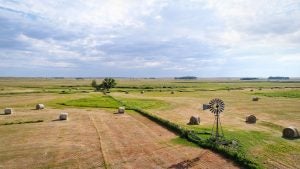Thirteen thousand years ago, around 11,500 BCE, the first glimmers of cultivation began to emerge in the Euphrates Valley in what is now Syria. Tell Abu Hureyra, the archeological site believed to be the place farmers first cultivated cereal crops such as wheat and rye, is today submerged under Lake Assad, the reservoir of the Tabqa Dam. A metaphor I am afraid, for what we are doing to our society when we ignore the perils faced by farmland, farming, and farmers today.
Subsequent to farming’s emergence at Abu Hureyra, it spread across the Levant, to Cyprus, Greece, south to Egypt and eventually into Europe by way of the Balkans. It spread fast in the scheme of human history, 15 miles a generation. As it spread, farming populations actually replaced those of hunter-gatherers. By 3500 BCE, farming had reached Britain and Northern Europe.
Early farming societies were egalitarian, collaborative, with little evidence of hierarchy. However, as populations grew, due to the nutritional certainty and the ability to have more children in a sedentary setting, humans had to find a way to deal with the complications inherent in larger groups. First religion, then central government, and soon immense civilizations such as Egypt. At this point farming had become the economy: the basis of exchange and payment (grain stores) and wealth (land). To farm at the scale needed to support an economy based on specialization, where not everyone grew their own food, took immense bureaucracies.
But when societies ignored problems in agriculture, time after time, these civilizations collapsed. What may not be written in our history books and only known well by archeologists who study the Neolithic Era, the era of transition to farming, problems in agricultural management, overuse of destructive agricultural practices that lead to environmental and man-made climate-related problems, mismanagement of land and labor, and ignorant behavior can lead to the end of times.

What is not new is what the collapse of the civilizations tells us: Agriculture must itself be cultivated, protected and renewed. Modern agriculture has advanced mightily, but it is not immune to societal indifference and negligence. Today, we face an equally uncertain future. Loss of farmland to ill planned and senseless development; climate change for which we are unprepared and too unwilling to confront; trade wars that could put millions of farmers out of business and poor farming practices that degrade our soils, cause erosion, pollute our water, air and food; all imperil our society and our civilization.
We can’t afford to ignore the plight of our farmers, the farmers who feed our growing population and steward the most precious asset we have in the country, our farmland. Only about 1 percent of our population farms today. The average farmer is 58 years old. As they retire over the next 20 years, 340 million acres will transition. To farming, maybe, but perhaps not. There are not enough new and beginning farmers to take their place. Farmland is expensive, so it often goes to developers. Putting farmers out of business ahead of their time and ahead of the benefits of solutions now just being put into place to get more new farmers on the land is short sided, to say the least.
We can’t afford to ignore the fate of our farmland — 2.3 billion acres that feed our growing population and provide fuel, fiber, flood mitigation by slowing the flow and filtering water from extreme weather events, and a carbon sink that is a significant climate change mitigation tool, capable of drawing down up to 2,000 tons of carbon per acre per year when managed correctly. Put to work, agricultural land in this world could sequester 20 percent of the world’s greenhouse gas emissions. Farmland sustains us, our loved ones, our friends and neighbors. It sustains our society and it sustains our planet. However, the conversion of farmland to development is occurring at an alarming rate — 2000 acres of agricultural land is lost every day. Eleven million acres have been paved over, fragmented. or converted to poorly planned residential, commercial, and industrial uses between 2001 and 2016 alone (Updated May 2020). It’s unsustainable. We will cease to exist as a society — the society we know anyway — if we don’t reverse this trend.
Solutions exist. Development can be smart. Farmland can be protected. More productive and more profitable farming practices can save our soil and our climate. Trade instead of aid. And a concerted effort in the form of training, innovative taxation and land protection programs aimed at getting new and beginning farms on the land are available to package up for an agricultural policy focused on the future, bereft of ideology, cognizant of external costs and protective and corrective of the current conditions. We just have to be brave. Put down our swords. And, pick up our sickles.
Lori Sallet is a farmer, an owner of preserved farmland, and the Media Relations Manager for American Farmland Trust.



